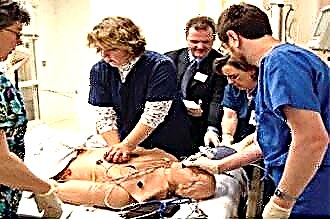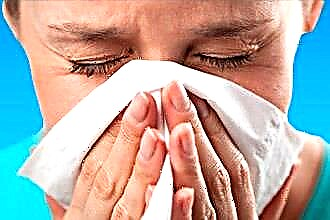Nasal discharge and sneezing are often troublesome with colds. Infectious diseases of the respiratory organs are frequent companions of the autumn-winter period. As for the spring-summer season, allergic rhinitis is more typical for it. What to take for a runny nose and sneezing? To get rid of unpleasant symptoms, drugs are required to reduce mucosal irritation and block hypersecretion.
 In addition to rhinorrhea, clinical symptoms of diseases may include:
In addition to rhinorrhea, clinical symptoms of diseases may include:
- hyperthermia, aching joints, muscles, severe weakness (with microbial rhinitis as a manifestation of intoxication);
- nasal congestion;
- Difficulty nasal breathing;
- cough;
- lacrimation, conjunctival hyperemia, itchy sensations in the eyes (as a sign of an allergic reaction);
- tickling in the nasopharynx;
- decreased appetite.
Treatment activities
Irritation of the nasal mucosa can be observed due to:
- contact with an allergen;
- inhalation of strong odors of chemicals;
- hypothermia;
- viral infection;
- mechanical damage to the mucous membrane;
- prolonged stay in a dusty room;
- abuse of spicy foods;
- proliferation of the lymphoid tissue of the tonsils;
- an increase in polyps;
- drying out of the nasal mucosa;
The range of medications prescribed depends on the cause of the runny nose and sneezing. Only by blocking the pathological process can the desired result in treatment be achieved and get rid of a runny nose and sneezing.

Allergy therapy
The appearance of local symptoms may be due to the development of an allergic reaction. An inadequate response of the immune system can be observed due to a genetic predisposition or concomitant autoimmune diseases.
The following groups of drugs are used in the treatment of allergies:
- antihistamines of systemic action (Loratadin, Erius, Tsetrin) in the form of tablets, syrup or solution for injection;
- antihistamines for local administration (intranasal drops, aerosols, gels) - Allergodil, Tizin Anallergin;
- vasoconstrictor - to reduce congestion and rhinorrhea (Lazorin, Nazivin);
- salt (Morenazal, Aqualor) - to cleanse the mucous membrane of allergens;
- steroid (Beconase, Fliksonase) - are prescribed for the treatment of severe forms of the disease.
Help with infectious rhinitis
In the treatment of rhinitis caused by a viral infection, from sneezing and a runny nose, the following groups of drugs should be used:
- antiviral systemic action (Groprinosin, Tsitovir, Aflubin, Remantadin) or for intranasal administration (Grippferon, Nazoferon);
- vasoconstrictor (Sanorin, Otrivin);
- salt (Dolphin, Salin);
- immunostimulating (Derinat, IRS-19);
- combined (Fervex, Maksikold) - means in powder form, which should be drunk from sneezing and body aches;
- vitamins (Alphabet, Supradin).
Treating other forms of rhinitis
How to treat vasomotor and other forms of rhinitis? To reduce the irritating influence of environmental factors and eliminate the symptoms of a cold, the following can be prescribed:
- salt preparations (Aqua Maris, Saline);
- homeopathic (Delufen) - to protect the nasal mucosa, stimulate regeneration and reduce the severity of inflammation;
- hormonal (Avamis, Nazonex);
- vegetable (Pinosol);
- protective (Nazoval) - create a film on the surface of the mucous membrane of the nasal passages.
The route of administration of the drug is selected depending on the severity of the disease. Usually nasal drops are prescribed, in a more severe case - tablet forms, syrups. For quick relief of the condition, an injection of the drug is required.
Next, consider the medications prescribed to treat rhinitis.
Systemic antihistamines
The drug Erius is prescribed for the common cold of allergic origin. Its action is aimed at blocking histamine receptors, as a result of which the progression of an allergic reaction is prevented.
The advantage of the remedy is the absence of a sedative effect, so it can be taken by people whose profession requires concentration.
The tablets are prescribed for patients over 12 years old. A single dose of 5 mg (1 tablet) per day is recommended. The tablet should not be chewed, it is allowed to drink a large volume of water. Erius's intake is not food related.
 The drug in the form of a syrup has been used from one year of age. Doses are selected depending on the age of the child.
The drug in the form of a syrup has been used from one year of age. Doses are selected depending on the age of the child.
The agent can cause such side reactions:
- headache;
- dryness in the nasopharynx;
- malaise;
- allergies (rash, swelling, tissue hyperemia);
- cardiopalmus.
Contraindications include only individual intolerance to the components.
Systemic antiviral agents
The tablet form of Groprinosin is prescribed for the viral origin of the common cold.
The tablet should be taken after meals and can be chewed or dissolved in water. Usually the drug is drunk in 2 tablets twice or three times a day. The duration of the course is 5 days. If necessary, therapy can be extended up to two weeks with a single dose adjustment.
The maximum daily dose is 8 tablets. It can be prescribed from one year of age.
Among the contraindications, it should be noted:
- hypersensitivity;
- exacerbation of gout.
In most cases, Groprinosin is well tolerated, however, the appearance of:
- headache;
- dizziness;
- ailments;
- nausea;
- soreness in the stomach area;
- joint pain;
- skin rashes;
- itchy sensations.
With prolonged use of Groprinosine, laboratory monitoring of uric acid is required.
Topical antihistamines
A severe runny nose of allergic origin can be cured with the help of Allergodil with an antihistamine component. The drug can be prescribed for temporary or permanent rhinitis associated with the action of the allergen on the body.
Usually, long-lasting liquid transparent snot indicates an allergy.
The aerosol is used to spray into the nose, one dose twice a day. Allergodil is prescribed from the age of six.
Contraindications are presented by individual intolerance to the components.
After spraying the drug, the following may appear:
- dizziness;
- bitter taste (if administered incorrectly);
- sneezing, itching sensations in the nasal passages;
- nausea.
Saline solutions
The medical solution Morenazal based on sea water cleanses the mucous membrane, moisturizes it, stimulates regeneration, reduces the viscosity of mucus and regulates its secretion.
 Morenazal can be used for prophylactic, therapeutic purposes. The saline solution is safe for use in infants, pregnant women, and during the lactation period.
Morenazal can be used for prophylactic, therapeutic purposes. The saline solution is safe for use in infants, pregnant women, and during the lactation period.
For treatment, it is recommended to spray two to three doses up to six times a day. After applying the solution to the nasal mucosa, you need to wait a couple of minutes, which is necessary to reduce the viscosity of mucus and dissolve dry crusts.
Now you can clean the passages with a cotton swab or a special aspirator used for babies.
Vasoconstrictor drugs
The main active ingredient of Sanorin is naphazoline. Available in the form of a solution for drip dosing. The drug provides vasospasm at the injection site, as a result of which the severity of tissue swelling, hyperemia, and the volume of mucous secretions decreases.
Thus, the medicine temporarily relieves nasal breathing. The duration of vasospasm lasts up to 5 hours, after which it is required to re-drip the medicine.
Sanorin is allowed from the age of three. It is recommended to instill 1-3 drops up to four times a day. The number of drops for a single injection depends on the patient's age, concomitant pathology and the severity of the disease.
Contraindications
 Sanorin drops are not recommended for:
Sanorin drops are not recommended for:
- hypersensitivity;
- atrophic type of rhinitis;
- taking certain antidepressants.
Care should be taken in treatment for arterial hypertension, diabetes, thyrotoxicosis, pheochromocytoma.
The maximum treatment course is 5 days, after which a break is required in the use of vasoconstrictor drugs. Excess doses are fraught with tachyphylaxis (addiction).
Adverse Reactions
After applying the medicinal solution to the nasal mucosa, the following symptoms may appear:
- baking sensations in the nasopharynx;
- dryness of the mucous membrane;
- severe nasal congestion;
- tissue edema, rash, itching (as signs of an allergic reaction);
- irritability;
- tremor;
- headache;
- arterial hypertension;
- heart palpitations;
- increased sweating.
Combined medicines
Fervex is available in powder form for making "tea". It is able to cure colds and strengthen the immune system. The composition includes vitamin C, paracetamol, pheniramine maleate. The combined composition allows:
- reduce tissue swelling;
- block the development of an allergic reaction;
- normalize the temperature;
- reduce a runny nose;
- relieve lacrimation, sneezing;
- eliminate body aches;
- increase the body's defenses.
Before taking, you should take into account the contraindications, side effects that relate to each component of Fervex.
Fervex is prescribed to patients over 15 years of age, one packet at most three times a day. The contents of the bag must be dissolved in warm water with a volume of 230 ml.
Today there are a huge number of drugs used in the treatment of rhinitis. It is important to read the instructions carefully and follow the recommended doses.



